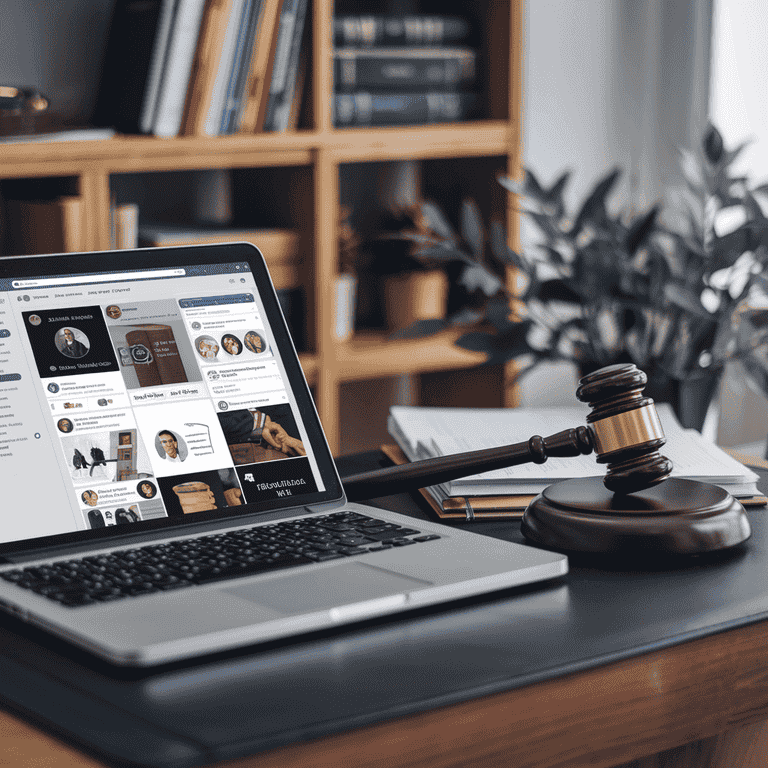The Impact of Social Media on Marriages
It’s no secret that social media can be a double-edged sword in relationships. Let’s explore how these platforms can affect marriages, sometimes pushing them to the brink of divorce.Communication Breakdown
Remember when couples used to talk face-to-face? Pepperidge Farm remembers. These days, it’s not uncommon for partners to communicate more through screens than in person. This digital divide can lead to:- Misunderstandings due to lack of tone and context
- Decreased intimacy and emotional connection
- Reduced quality time spent together
Jealousy and Trust Issues
Social media can be a breeding ground for jealousy and suspicion. A simple “like” on an ex’s photo or a friendly comment from a coworker can spiral into a full-blown argument. This constant exposure to potential threats can erode trust over time.Unrealistic Expectations
We’ve all seen those picture-perfect couples on Instagram, right? The problem is, these curated glimpses into others’ lives can create unrealistic expectations for our relationships. This can lead to:- Constant comparisons with other couples
- Feelings of inadequacy or dissatisfaction
- Pressure to maintain a “perfect” image online
Social Media as a Catalyst for Divorce
In some cases, social media doesn’t just strain a marriage – it can be the final straw that leads to divorce. Let’s explore how these platforms can become catalysts for marital dissolution.Online Infidelity
Gone are the days when cheating required secret rendezvous and lipstick-stained collars. Today, infidelity can happen with just a few clicks. Online affairs, whether emotional or leading to physical encounters, have become increasingly common. Some red flags include:- Excessive secrecy around phone or computer use
- Late-night messaging or social media activity
- Sudden changes in online behavior or privacy settings

Reconnecting with Past Partners
Social media makes it easier than ever to reconnect with old flames. What starts as innocent catching up can sometimes rekindle old feelings, threatening current relationships. It’s a slippery slope from “Hey, remember me?” to “I can’t stop thinking about you.”Public Airing of Marital Grievances
We’ve all seen those cringe-worthy posts where someone airs their dirty laundry for all to see. When marital problems become public fodder, it can:- Escalate conflicts
- Damage reputations
- Make reconciliation more difficult
Addiction to Social Media Platforms
For some, social media use goes beyond a habit and becomes a full-blown addiction. This can lead to:- Neglect of family responsibilities
- Decreased productivity at work
- Emotional detachment from real-life relationships
Legal Implications of Social Media in Divorce Cases
So, you thought those vacation selfies were harmless? Think again. In divorce law, your social media activity can become a goldmine of evidence. Let’s dive into how your online life can impact real-life divorce proceedings.Evidence Gathering
Remember that old saying, “Anything you say can and will be used against you”? In the digital age, it’s more like “Anything you post can and will be used against you.” Here’s what lawyers might be looking for:Posts and Comments
That rant about your soon-to-be ex? It might just show up in court. Lawyers can use your posts to paint a picture of your character, lifestyle, or even your fitness as a parent. So think twice before hitting that “Post” button!Photos and Videos
A picture is worth a thousand words, and it might be worth thousands of dollars in divorce court. Photos can be used to:- Prove infidelity
- Show lavish spending habits
- Demonstrate neglectful behavior

Location Check-ins
Your Foursquare mayor status at the local bar might impress your friends, but it won’t look great to a judge. Location data can be used to:- Track spending habits
- Prove or disprove alibis
- Show patterns of behavior
Privacy Concerns
In the age of oversharing, privacy is more important than ever. Here’s what you need to know:Account Access and Shared Passwords
Are you still using your anniversary as your password? It’s time to change that. Shared accounts or passwords can lead to unauthorized access, a legal minefield.Impact on Divorce Settlements
Your social media activity can have real-world consequences when dividing assets and determining support.Asset Division
That new car you bragged about on Instagram? It might just tip the scales in asset division. Social media can reveal:- Hidden assets
- Undisclosed income
- Lavish lifestyles inconsistent with reported earnings
Alimony and Child Support
Your Twitter feed with job updates and promotions might be great for your career, but it could impact alimony or child support calculations. Courts can use this information to assess your earning capacity and financial status.Best Practices for Social Media Use During Divorce
Now that we’ve scared you straight about the perils of social media during divorce, let’s talk about how to navigate these treacherous waters safely.Limiting or Suspending Social Media Activity
The safest bet? Go dark. Consider taking a social media hiatus during your divorce proceedings. If that’s impossible, consider your accounts a digital minefield. Tread carefully!Adjusting Privacy Settings
Time for a privacy checkup! Lock down your accounts tighter than Fort Knox. Here’s a quick checklist:- Set all accounts to private
- Review and update friend lists
- Turn off location services
- Disable tagging in photos
Avoiding Negative Posts About Your Spouse
We get it. You’re angry, hurt, and want the world to know what a jerk your ex is. But resist the urge to vent online. Negative posts can:- Escalate conflicts
- Be used against you in court
- Make co-parenting more difficult

Being Mindful of Financial Disclosures
That humble brag about your bonus? It could come back to bite you. Be careful about posting anything related to:- New purchases
- Vacations
- Job changes or promotions
Refraining from Discussing Legal Proceedings Online
Your divorce drama might seem prime content for your followers, but keep it off social media. Discussing your case online can:- Violate confidentiality agreements
- Provide ammunition for the opposing side
- Potentially influence the outcome of your case
Social Media and Child Custody Battles
Ah, the joys of parenting in the digital age. It’s not just about keeping the kids off their phones at dinner anymore. Regarding custody battles, your social media presence can be a make-or-break factor. Let’s dive into this minefield, shall we?Impact on Parenting Time Decisions
Remember when you posted about your wild night out while the kids were with your ex? Pepperidge Farm remembers, and so might the judge. Here’s how your online activity can influence parenting time:- Posts showing irresponsible behavior can reduce your parenting time
- Evidence of positive parenting can work in your favor
- Inconsistencies between your online persona and courtroom claims can damage credibility
Protecting Children’s Privacy During Divorce
In the age of sharenting, it’s crucial to consider your kids’ digital footprint during a divorce. Here are some dos and don’ts:- DO discuss social media rules with your ex
- DON’T post photos that might embarrass your children
- DO be mindful of location tags that could reveal your kids’ whereabouts
- DON’T use social media to communicate with your children about the divorce
The Role of Social Media in Post-Divorce Life
Congratulations! You’ve made it through the divorce. But wait, there’s more! Social media continues to play a role in your post-divorce life. Let’s navigate this brave new world together.Co-parenting and Communication
Remember when co-parenting meant awkward phone calls and tense in-person meetings? Welcome to Co-parenting 2.0. Social media can be a useful tool, if used wisely:- Private Facebook groups for sharing important information
- Shared Google calendars for coordinating schedules
- Photo-sharing apps to keep both parents involved in the kids’ lives
Dating and New Relationships
Ready to dip your toes back into the dating pool? Social media can be your wingman or your worst enemy. Here’s a quick guide:- DO wait until you’re ready before changing your relationship status
- DON’T badmouth your ex on dating profiles
- DO be cautious about introducing new partners on social media, especially if you have kids
- DON’T stalk your ex’s new flame online (we know it’s tempting, but trust us on this one)
Rebuilding Personal Identity
Divorce can feel like losing a part of yourself. Social media can be a powerful tool for rediscovering who you are. Some ideas:- Start a blog about your new adventures
- Join online communities related to your interests
- Share photos of your solo travels or new hobbies
Legal Guidance and Social Media Management
Navigating social media during and after divorce can feel like walking through a minefield blindfolded. Sometimes, you need a guide. That’s where the professionals come in.
Working with Attorneys on Social Media Strategies
Your lawyer isn’t just there to file paperwork. They can be your social media strategist too. Here’s what they might advise:- Creating a social media policy for both parties during the divorce
- Reviewing your accounts for potentially damaging content
- Advising on what to post (and more importantly, what not to post)
Digital Forensics in Divorce Cases
Think you’re a master of covering your digital tracks? Think again. Digital forensics professionals can uncover:- Deleted messages and posts
- Hidden social media accounts
- Evidence of online affairs or inappropriate behavior
Creating a Social Media Policy During Proceedings
A social media policy during divorce isn’t just a good idea – it can be a lifesaver. Here’s what it might include:- Agreement not to post about the divorce or each other
- Rules about posting photos of children
- Guidelines for communicating through social media

Conclusion
Well, folks, we’ve navigated the treacherous waters of social media and divorce. Let’s wrap this up with some final thoughts, shall we?
The Importance of Social Media Awareness in Divorce
Remember when the biggest worry in a divorce was who got the CD collection? (Millennials, ask your parents.) Now, your entire digital life can be put under a microscope. Here’s why staying social media savvy is crucial:
- Your online activity can make or break your case
- Social media can impact everything from asset division to custody
- What you post today could haunt you tomorrow (or in court next month)
Think of social media as a powerful tool – like a chainsaw. It can be incredibly useful, but one wrong move and… well, let’s just say it won’t be pretty.
Balancing Online Presence with Legal Protection
So, should you go full hermit and delete all your accounts? Not necessarily. It’s all about finding that sweet spot between staying connected and protected. Here are some final tips to keep in mind:
- Think before you post. Always.
- Assume everything is public, even if it’s set to private.
- When in doubt, ask your lawyer. (They love that, trust me.)
- Remember that your online persona is an extension of your real-life self in the eyes of the law.
The bottom line? In the world of divorce, your smartphone can be your best friend or your worst enemy. Choose wisely. And there you have it, folks – your crash course in navigating social media during divorce. Remember, in this digital age, what happens online doesn’t stay on the internet. It ends up in divorce court.
So the next time you’re tempted to post that snarky comment about your ex or that photo of your expensive new purchase, pause. Take a deep breath. And ask yourself: “Is this worth potentially losing half my stuff over?” Stay smart, stay safe, and may your feeds be drama-free. And if all else fails, there’s always MySpace. I hear it’s making a comeback. (Just kidding. Please don’t go on MySpace.)

Frequently Asked Questions
Can my spouse use my social media posts against me in divorce proceedings?
Your spouse can use your social media posts as evidence in divorce proceedings. Courts may consider posts, photos, videos, and location check-ins admissible evidence. This content can impact various aspects of your divorce, including asset division, alimony, and child custody decisions.
Should I delete my social media accounts during my divorce?
While deleting your accounts might seem safe, it’s not always the best course of action. Deleting accounts or posts could be seen as destroying evidence, which may have legal consequences. Instead, consider temporarily deactivating your accounts or significantly limiting your activity after consulting with your attorney.
How can I protect my privacy on social media during a divorce?
To enhance your privacy during divorce proceedings:
- Update all privacy settings to the highest level
- Change your passwords, especially if your spouse knew them
- Be cautious about accepting new friend requests
- Consider using a nickname instead of your full name
- Avoid posting about your location or daily activities
Can private messages on social media platforms be used in court?
Yes, private messages can potentially be subpoenaed and used as evidence in court. Even if you’ve deleted these messages, they may still be recoverable through digital forensics. Always assume that any digital communication could become part of the legal record.
How might social media affect child support payments?
Social media posts can influence child support payments if they demonstrate a lifestyle inconsistent with reported income. For example, posts showing expensive purchases or luxurious vacations might suggest hidden income or assets, potentially leading to increased support obligations.
Is it okay to start dating and share about it on social media during my divorce?
While it’s not illegal to date during divorce proceedings, sharing about new relationships on social media can complicate matters. It may escalate conflicts with your spouse, affect custody decisions, or influence alimony determinations. Keeping new relationships private until the divorce is finalized is generally advisable.
How can social media help in proving infidelity?
Social media can provide evidence of infidelity through:
- Photos or check-ins showing a spouse with another person
- Intimate or flirtatious messages
- Creation of dating profiles
- Suspicious patterns of activity or communication
However, obtaining this information legally and ethically is crucial, as improper access to accounts can have legal repercussions.
Can I be held in contempt of court for violating a social media agreement?
Yes, if a social media agreement is part of a court order, violating it could potentially result in contempt of court. This could lead to fines, penalties, or even impact the final divorce settlement. Always adhere to any agreements or orders regarding social media use during your divorce.

Glossary

Additional Resources for You
Our esteemed lead attorney, Molly Rosenblum Allen, Esq., not only excels in her legal practice but also dedicates her time to creating valuable resources for those navigating the complexities of divorce. Her comprehensive insights and compassionate guidance are reflected in a series of informative articles available on our website. We encourage our readers to explore these resources to find support and understanding during challenging times:
Las Vegas Divorce Attorney: Offering detailed guidance through the legal landscape of divorce in Las Vegas. Read more.
How to Cope with Divorce: A profound resource providing strategies to manage the emotional journey of divorce. Explore here.
Moving On After Divorce from a Narcissist: Empowering individuals with tools to rebuild their lives after separating from a narcissistic partner. Read further.
Divorce Effects on Children’s Education: Highlighting the potential impacts of divorce on the educational journey of children. Understand more.
Introducing New Partner to Child After Divorce: Guidance on how to approach this sensitive step in the most supportive way for your child. Discover how.
Child Therapy and Divorce: Stressing the importance of professional support for children to healthily process the changes in their family dynamics. Learn the benefits.
Rebuilding Social Life After Divorce: Tips and encouragement for re-establishing a fulfilling social life post-divorce. Start rebuilding.
Signs Your Child is Struggling with Your Divorce: Recognizing the signs of distress in children and how to address them effectively. Recognize the signs.
Top Tips For Parenting Through Divorce: Practical advice for maintaining stability and nurturing for your children during this transition. Get the tips.
Managing Stress and Emotions During Divorce: Strategies to handle the emotional rollercoaster and maintain personal well-being throughout the divorce process. Manage your stress.
Molly Rosenblum Allen, Esq. is committed to providing support and clarity during the tumultuous journey of divorce, ensuring that you don’t have to navigate these waters alone. Feel free to peruse these resources at your convenience for guidance and support.

Offsite Resources You May Find Helpful
Family Law Self-Help Center – Clark County, Nevada: Provides self-help resources and information for individuals navigating family law matters, including divorce, in Clark County, Nevada.
American Psychological Association – Divorce Resources: Offers resources and articles on divorce-related topics, including the impact of social media on divorce and mental health.
DivorceMag: An online publication that covers various aspects of divorce, including articles on social media and divorce, effective advice, and resources.
Marriage.com – Divorce and Social Media: Provides articles and advice on the intersection of social media and divorce, addressing potential challenges and offering tips for managing social media during divorce.
More Frequently Asked Questions
How can social media platforms impact divorce proceedings?
How can social media usage impact legal matters, such as divorce cases?
What do divorce lawyers do, and why do I need one?
How can mutual friends impact a divorce case?

A Special Message from Our Lead Attorney

Molly Rosenblum, Esq
Dear Reader,
Thank you very much for your time and interest in reading our resources about the potential impact of social media posts on divorce proceedings. This is an often underappreciated aspect which can significantly influence the outcome of a case, and your proactive approach to understanding it is commendable.
Each divorce case is unique, and understanding how individual elements like social media usage factor into your specific circumstances is crucial. My team and I at The Rosenblum Allen Law Firm are here to provide personalized advice, assistance, and support based on your specific situation.
I invite you to get in touch with us at (702) 433-2889. Let’s discuss your situation, explore your options, and begin creating a strategic plan tailored to your needs. We are prepared to offer the legal advice and guidance you need at every stage of the process.
Thank you again for trusting in our resources. I look forward to potentially working with you soon.
Best regards,
Molly Rosenblum, Esq.




